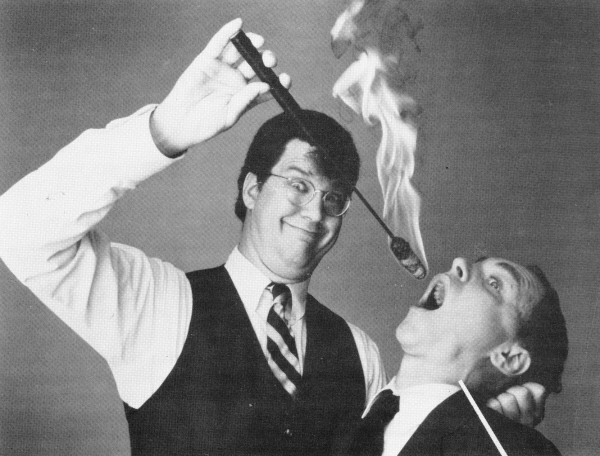
Penn and Teller |
Page 13 Summer 1985
|
Juggling
in a magical context by
Joel Fink
January
20, 1985. The Super Bowl
The
small turnout on Super Sunday did not represent the packed houses that
have enthusiastically greeted this team, billed as
"the bad boys of magic. " Although small in number. the
audience was quickly caught up in the duo's special brand of
performance.
Part
of the fascination of the act is the unexpected "juggling"
perspective that
Similarly,
Penn and Teller
demystified the illusion of certain tricks, leaving the audience
all the more awed by their skill at
manipulation. Ironically, those tricks that did depend on illusion
became all the more magical with this approach.
The
juggling routines were similar. Penn began
by announcing that the juggling tricks
were the weakest part of
the show, and so he would get them out of the way first. This
disclaimer was the only part of
the performance that struck a false
note,
Juggling
routines in the show give credibility to later tricks. With
juggling they say,
"we do the standard things," and with
the magic they say "here's
what else we
do." Juggling, therefore, provides a context
for the whackier and more exotic parts
of their act.
In
a confession during a later
interview, Penn revealed that the "bad boys of magic"
actually have a bad attitude about
Praising
Moschen's work, Penn said, "Michael chooses to do something about
the problem, while I choose to complain." He believes that
excepting special talent, "Jugglers should keep it short and not
miss. " His
attitudes about magic are similar. He said most magicians degrade As
it stands, their show includes two additional juggling routines. Penn
eats an apple while juggling, but gives the routine a special dynamic
through his very real
In
another instance, when he Juggled three large knives, Penn developed a
routine which ended
with the knives juggled around a hooded audience member.
During
the show's final section, a fireeating act, danger and its
relationship to
Unlike
a number of other contemporary magicians, Penn and Teller's act was at
a very human scale. They used no large illusions or elaborate
mechanical set-ups. Instead, their work was carefully structured to
develop a relationship with their audience in a theatre setting.
Props
were simple and everyday - folding chairs, ropes and ordinary-looking
bottles. Through their magic, however, objects and events took on new
and unexpected dimensions and textures. A handcuff escape became the
theme for a scene which explored complex elements of social
relationships. In another scene, Teller used a flower, a
shadow, a knife and himself to silently and elegantly develop a theme
and variations on the nature of illusion and reality.
Magic
and juggling was the means, but at the end, entertainment seemed to
transform into a very new and unique understanding between audience
and actors. As Penn suggested, they want their audiences to leave
wondering not "how" |

Penn and Teller |